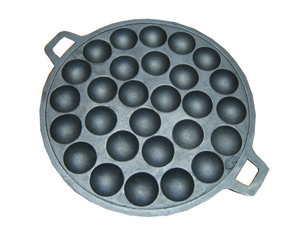Additional Notes for Making Hor Mok Plaa
This is part of our Thai Curried Mousse of Red Snapper in Steamed in Banana Leaf Cups recipe. See full Hor Mok recipe.
'Haw Mok' Notes and Pointers:
 Some Thai restaurants steam the fish curry in Kanom Krok Pans. This permits a pretty presentation served in terra cotta pots with lids. Along the beaches in the South of Thailand, resorts steam the curry in bowls, and serve them inside young coconuts with tops chopped open and juice removed. The soft flesh of the coconut can be spooned out and eaten along with the curry. You can also still find haw mok prepared in banana leaves in the open marketplace.
Some Thai restaurants steam the fish curry in Kanom Krok Pans. This permits a pretty presentation served in terra cotta pots with lids. Along the beaches in the South of Thailand, resorts steam the curry in bowls, and serve them inside young coconuts with tops chopped open and juice removed. The soft flesh of the coconut can be spooned out and eaten along with the curry. You can also still find haw mok prepared in banana leaves in the open marketplace.
Traditional haw mok is not really a "mousse" as chunks of fish cut through bone are cooked in a custard-like, red curry sauce. Normally a vegetable is included on the bottom of the cup, making it a complete dish on its own. Haw mok is not only made with various kinds of fish, but is frequently a combination of seafood, including squid, shrimp, shelled mussels and even chunks of unshelled crab. Cambodian cuisine has a similar dish with a similar name. Fish coated with spiced coconut cream is wrapped with banana leaves into packets and then steamed or grilled.
If banana leaves are not available in markets near you, or if making them is a bit daunting, the curried mixture may also be steamed in small custard cups. Of course, the flavor will not be quite the same. Or line a round souffle dish with banana leaf, spoon in the entire fish mixture and decorate the top in any way you wish to impress your dinner guests. Steam until the custard is set and the fish cooked through on a steamer rack of a stacked steamer (about 30 minutes).
'Haw mok' can be made ahead of time and reheated by steaming or in the microwave. If fully spiced, it keeps for up to one week in the refrigerator. Like most curries, it tastes better after it has had the chance to sit for a while after cooking for the flavors to mingle and marry. The custard will also be firmer and less watery after it has completely cooled before reheating.
Recipe Copyright © 2000 Kasma Loha-unchit
- See the full Hor Mok Plaa Recipe
- Buy a Khanom Krok Pan in our cookware store
- Buy frozen Banana Leaf from our store
- Shop for cooking ingredients in our Thai grocery
